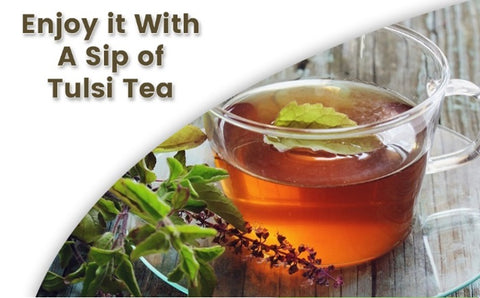Tulsi is an aromatic shrub referred to as Ocimum Sanctum or 'Holy Basil' that belongs to the mint family and is found in 150 different varieties worldwide.
In Ayurveda, Tulsi is known as “The Incomparable One,” “Mother Medicine of Nature” and “The Queen of Herbs,” and is revered as an “elixir of life” that is without equal for both its medicinal and spiritual properties.
In India, Tulsi has been a part of spiritual rituals and lifestyle practices. The plant is worshipped everyday in religious Hindu households. But most people have forgotten the art of using it in their kitchens and daily life.
The vast array of health benefits of Forgotten Tulsi herb are just beginning to be confirmed by modern science. This emerging science on Tulsi, which reinforces ancient Ayurvedic wisdom, suggests that Tulsi is an elixir for the body, mind and spirit that offers solutions to many modern day health problems.
Tulsi usually has a bitter taste and its roots, leaves and seeds consist of several medicinal properties.
Benefits of Forgotten Tulsi Herb
Daily consumption of Tulsi is said to prevent disease, promote general health, wellbeing and longevity and assist in dealing with the stresses of daily life.
Tulsi is also credited with giving luster to the skin complexion, sweetness to the voice and fostering beauty, intelligence, stamina and a calm emotional
In addition to these health-promoting properties, Tulsi is recommended as a treatment for a range of conditions including anxiety, cough, asthma, diarrhea, fever, dysentery, arthritis, eye diseases, otalgia, indigestion, hiccups, vomiting, gastric, cardiac and genitourinary disorders, back pain, skin diseases, ringworm, insect, snake and scorpion bites and malaria.
The medicinal properties of tulsi have been studied in lots of scientific studies including animal and human experiments. These studies reveal that tulsi has a unique combination of actions that include:
Antimicrobial including
- antibacterial
- antiviral
- antifungal
- antiprotozoal
- antimalarial
- anthelmintic
and various other actions including anti-diarrheal, anti-oxidant, anti-cataract, anti-inflammatory, chemopreventive, radioprotective, hepato-protective, neuro-protective, cardio-protective, anti-diabetic, anti-hypercholesterolemia, anti-hypertensive, anti-carcinogenic, analgesic, anti-pyretic, anti-allergic, immunomodulatory, central nervous system depressant, memory enhancement, anti-asthmatic, anti-thyroid, anti-ulcer, anti-spasmodic, anti-arthritic, adaptogenic, anti-stress and anti-coagulant activities.
These pharmacological actions help the body and mind cope with a wide range of chemical, physical, infectious and emotional stresses and restore physiological and psychological function.
How to use Tulsi?
- You can directly consume small amounts of fresh Tulsi leaves from your home garden everyday. Tulsi leaves can be soaked overnight in water that is kept in a copper vessel. It is beneficial to consume this infused water early in the morning.
- Brew tea with fresh Tulsi leaves along with Cinnamon, lemon or lemon grass for enhancing the flavour. The act of drinking tea can be ritualistic and as calming as yoga.
- You could also buy dry Tulsi leaves powder that is available online by various brands such as SUPPLE foods. You can mix the powder (1 tsp or 2 grams) with warm water or milk or as directed by the physician. Stir thoroughly and drink every morning.
- You can also consume Forgotten Foods Ayush Kadha which contains Tulsi along with other spices such as Cinnamon (Dalchini), Ginger (Shunti) and Black Pepper. These ingredients are recommended by the Ministry of Ayush to fight viral infections.
Just mix the powder with hot water, optionally add fresh lemon, mix thoroughly and drink it everyday.
Start consuming this wonder forgotten herb in your daily life and become a part of reviving it.
Note - Always consult your doctor before taking supplements. Like many supplements, holy basil is not approved as a first-line treatment. It may also interact with medications you’re already taking.
References
Uses of Tulsi (Holy Basil): Benefits and Supplements - https://www.medlife.com/blog/uses-tulsi-holy-basil-benefits-supplements/
Tulsi - Ocimum sanctum: A herb for all reasons - https://www.ncbi.nlm.nih.gov/pmc/articles/PMC4296439/
The health benefits of Holy Basil - https://www.healthline.com/health/food-nutrition/basil-benefits#Not-your-basic-basil




Comments (0)
Back to News